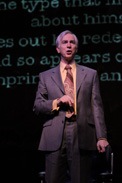SITE GUIDE
SEARCH
REVIEWS
REVIEW ARCHIVES
ADVERTISING AT CURTAINUP
FEATURES
NEWS
Etcetera and
Short Term Listings
LISTINGS
Broadway
Off-Broadway
NYC Restaurants
BOOKS and CDs
OTHER PLACES
Berkshires
London
California
New Jersey
DC
Connecticut
Philadelphia
Elsewhere
QUOTES
TKTS
PLAYWRIGHTS' ALBUMS
LETTERS TO EDITOR
FILM
LINKS
MISCELLANEOUS
Free Updates
Masthead
A CurtainUp Review
Tynan
|
The true critic cares little for here and now. The last thing he bothers about is the man who will read him first. His real rendezvous is with posterity. —Kenneth Tynan
|

Philip Goodwin as Kenneth Tynan
|
A chair center stage against a bare wall in need of plastering that could be the back wall of a theater, or anywhere. Rear-screen projections— hard to make out from some seats— are supposed to remind the audience of events that were contemporaneous to Tynan's diary entries.
Kenneth Peacock Tynan, born in Birmingham, England in 1927, was the illegitimate son of a successful businessman and a theatre-loving mother. While at Oxford, where he quickly became something of a celebrity, often wearing a skin-tight purple suit, he participated in theater and in debate. But it was his tutor, C. S. Lewis, a medievalist and author of The Chronicles of Narnia, who was the first to recognize Tynan's literary talent as well as his proclivity for depression. In Tynan's diaries and the play that includes his not-so-private thoughts, Tynan acknowledges Lewis's role in showing him how to live as well as write.
After Oxford, Tynan's highly intelligent thoughts and deft word play as a drama critic (off the page he stuttered) led to his being described by the literati of the day as the greatest theater critic since George Bernard Shaw. He was also a celebrity, a socialist, an anti-bourgeois provocateur, a devotee of sexual games — and above all, a wicked-tongued wit. When asked to describe the difference between the mistress he liked to spank and the wife who he professed to love and with whom he had two children, he answered that his mistress was "like curry" and his wife, "French cuisine."
Tynan's influence on 20th century theatere was felt not just in his criticism. He was one of the founders of London's National Theatre, he championed plays with socialist and sexual themes, and he challenged censorship by the Lord Chamberlin, until that post was abolished in 1968. He wrote lengthy (and profitable) profiles of legendary English actors Laurence Olivier and Ralph Richardson. Tynan was also the mastermind of what was billed as "elegant erotica," a collection of scenes, many nude, written by several authors called Oh, Calcutta! For its day, it was a revolutionary piece that lead to a debate on what is and what is not tasteful. (T"his is the kind of show to give pornography a bad name," wrote critic Clive Barnes).
Poor health, emphysema mostly, and the need for work led Tynan to emigrate from England to California, where he died in 1980. While in California he developed writer's block. As he put it "I've been working non-start since January.", He did keep the diaries on which this solo play is based. As insightful, amusing, name-dropping, and self-revealing as those diaries are, they are not Tynan's best writing. For that you would have to look up his pieces in the New Yorker, his letters to his second wife Kathleen, and collections of his essays and reviews.
The diary entries are presented by actor Philip Goodwin in a somewhat subdued performance but, given that Tynan was such a flamboyant and often outrageous person, they are of interest — not just because Tynan was a theater giant but because he was such a complex human being who had no fear in saying what he wanted to say and doing what he wanted to do.
|
Tynan, written by Richard Nelson and Colin Chambers Based on the Diaries of Kenneth Tynan, edited by John Lahr By arrangement with Tracy Tynan and Carol Baum Directed by Paul Mullins Starring Philip Goodwin Running time: 90 minutes January 19 to February 13, 2011 Studio Theatre, 1501 Fourteenth Street, NW; 202-332-3300; studiotheatre.org Review by Susan Davidson based on Sunday matinee performance, January 23, 2011. |
|
REVIEW FEEDBACK Highlight one of the responses below and click "copy" or"CTRL+C"
Paste the highlighted text into the subject line (CTRL+ V): Feel free to add detailed comments in the body of the email. . .also the names and emails of any friends to whom you'd like us to forward a copy of this review. Visit Curtainup's Blog Annex For a feed to reviews and features as they are posted add http://curtainupnewlinks.blogspot.com to your reader Curtainup at Facebook . . . Curtainup at Twitter Subscribe to our FREE email updates: E-mail: esommer@curtainup.comesommer@curtainup.com put SUBSCRIBE CURTAINUP EMAIL UPDATE in the subject line and your full name and email address in the body of the message Click on the address link E-mail: esommer@curtainup.com Paste the highlighted text into the subject line (CTRL+ V): Feel free to add detailed comments in the body of the email. . .also the names and emails of any friends to whom you'd like us to forward a copy of this review. Visit Curtainup's Blog Annex For a feed to reviews and features as they are posted add http://curtainupnewlinks.blogspot.com to your reader Curtainup at Facebook . . . Curtainup at Twitter Subscribe to our FREE email updates: E-mail: esommer@curtainup.comesommer@curtainup.com put SUBSCRIBE CURTAINUP EMAIL UPDATE in the subject line and your full name and email address in the body of the message |




